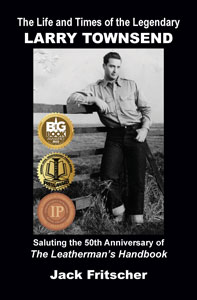NON-FICTION BOOK
by Jack Fritscher
How to Quote from this Material
Copyright Jack Fritscher, Ph.D. & Mark Hemry - ALL RIGHTS RESERVED

The Life and Times of the Legandary Larry Townsend
5
THE NAME GAME
HOLLYWOOD BABYLON
The post-Stonewall cultural revolution, a mix of Marx and Mao, found queer sport in hunting out “alias” identities because plain-clothes detectives and gays who were police informants used fake names which, because of deception, was not cool, especially in gay bars where nicknames, like drag names, were often needed as a common self-defense for privacy. Larry, the former military spy, was attacked for his “double identity” by gay political opponents as if his pen name becoming his legal name somehow invalidated his integrity in liberation politics as president of H.E.L.P. As the astrologer predicted, his challengers did not like him tyrannizing over them, nor did they appreciate his Thor-like thunder of Germanic anger over trifles. (His Swiss half, he said, was neutral.) Perhaps his critics did not yet know that midcentury gay men Thomas Lanier Williams became Tennessee Williams and Truman Streckfus Persons became Truman Capote and Touko Valio Laaksonen became Tom of Finland.
His friend “J. R.”—most likely John Rowberry who succeeded me as the third editor of Drummer—wrote in the hybrid H.E.L.P.Drummer in May 1973:
Larry has been attacked for not using his “real” name...“Michael Lawrence Townsend” has been his legal name since he became involved in the Movement. I know, because I went through all the soul-searching with him...I suggested that he go through a legal change of name, since he never liked his first name, anyway, and “Townsend” was his middle name....I think this was the most liberating thing he could do. It marked a complete cut with the closety past and left him free to do or say whatever he wanted without involving his family....
Because Larry Townsend, a master of dominance and submission, noted that mainstream gay history characteristically separates and suppresses alternative leather history, especially the erotic, to keep it invisible and unexplored by means of its withering vanilla gaze, it is worth citing that he ran his West Coast book publishing house for five years before novelist Felice Picano pioneering in Manhattan founded his indie SeaHorse Press in 1977, and then in 1980 became a founding member of the Violet Quill along with Andrew Holleran—the pen name of Eric Garber—and with Edmund White who said on the Lambda Literary site in 2013 that Holleran’s Dance from the Dance (1978) was a brand new portrayal showing “gay men living among gay men,” which was, more accurately, the exact kind of male-bonding portrayal Larry had been dramatizing in his novels since 1969 and Drummer had been publishing since 1975.
While these mostly New Yorkers may have suggested they were founders of modern gay writing, there already existed, besides the agitated agitator Larry Kramer, a litany of a hundred midcentury LGBT novelists, nearly all using pen names. Mary Renault, Patricia Highsmith, Ann Bannon, Rita Mae Brown, and Patricia Nell Warren were already frontrunners alongside Sam Steward, James Barr, James Baldwin, James Purdy, James Leo Herlihy, John Coriolan, John Rechy, Gore Vidal, Carl Corley, and Larry Townsend.
As a writer and photographer, Larry was an essential eyewitness of the drama performed around Drummer in which his novels were sometimes excerpted next to the educational advice and self-help columns he contributed starting in 1980.
Contrary to myth, Larry Townsend was not a founder of Drummer. However, along with Robert Mapplethorpe, and Robert Opel who streaked the 1974 Academy Awards, Larry Townsend was a charter member of the sex, art, and salon around Drummer which helped invent the very leather culture it reported on. “I’m not a Drummer writer,” he wrote of himself:
I’m a novelist whose books were often excerpted in Drummer. In 1978, Jack Fritscher, the new editor of Drummer, took me to supper [in San Francisco] and began to convince me over pasta [at the Haystack restaurant, 3881 24th Street] that the San Francisco Drummer of the late 1970s was a different Drummer than Los Angeles Drummer. [As founding San Francisco editor-in-chief, I strengthened, virilized, and darkened Drummer which had been born blond in LA.] After many more months of Jack’s friendly persuasion, I came on board because so many of the fans of my books were also Drummer subscribers.